Information injection-pump assembly
BOSCH
9 400 615 932
9400615932
ZEXEL
101641-9180
1016419180
NISSAN-DIESEL
16713L6001
16713l6001
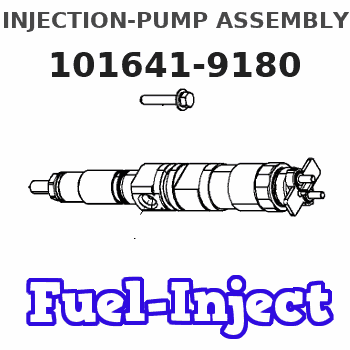
Rating:
Cross reference number
BOSCH
9 400 615 932
9400615932
ZEXEL
101641-9180
1016419180
NISSAN-DIESEL
16713L6001
16713l6001
Zexel num
Bosch num
Firm num
Name
9 400 615 932
16713L6001 NISSAN-DIESEL
INJECTION-PUMP ASSEMBLY
SD33T * K 14BE INJECTION PUMP ASSY PE6A PE
SD33T * K 14BE INJECTION PUMP ASSY PE6A PE
Calibration Data:
Adjustment conditions
Test oil
1404 Test oil ISO4113 or {SAEJ967d}
1404 Test oil ISO4113 or {SAEJ967d}
Test oil temperature
degC
40
40
45
Nozzle and nozzle holder
105780-8140
Bosch type code
EF8511/9A
Nozzle
105780-0000
Bosch type code
DN12SD12T
Nozzle holder
105780-2080
Bosch type code
EF8511/9
Opening pressure
MPa
17.2
Opening pressure
kgf/cm2
175
Injection pipe
Outer diameter - inner diameter - length (mm) mm 6-2-600
Outer diameter - inner diameter - length (mm) mm 6-2-600
Tester oil delivery pressure
kPa
157
157
157
Tester oil delivery pressure
kgf/cm2
1.6
1.6
1.6
Direction of rotation (viewed from drive side)
Right R
Right R
Injection timing adjustment
Direction of rotation (viewed from drive side)
Right R
Right R
Injection order
1-4-2-6-
3-5
Pre-stroke
mm
2.3
2.25
2.35
Beginning of injection position
Drive side NO.1
Drive side NO.1
Difference between angles 1
Cal 1-4 deg. 60 59.5 60.5
Cal 1-4 deg. 60 59.5 60.5
Difference between angles 2
Cyl.1-2 deg. 120 119.5 120.5
Cyl.1-2 deg. 120 119.5 120.5
Difference between angles 3
Cal 1-6 deg. 180 179.5 180.5
Cal 1-6 deg. 180 179.5 180.5
Difference between angles 4
Cal 1-3 deg. 240 239.5 240.5
Cal 1-3 deg. 240 239.5 240.5
Difference between angles 5
Cal 1-5 deg. 300 299.5 300.5
Cal 1-5 deg. 300 299.5 300.5
Injection quantity adjustment
Adjusting point
-
Rack position
12
Pump speed
r/min
1150
1150
1150
Average injection quantity
mm3/st.
38.4
37.3
39.5
Max. variation between cylinders
%
0
-2.5
2.5
Basic
*
Fixing the rack
*
Standard for adjustment of the maximum variation between cylinders
*
Injection quantity adjustment_02
Adjusting point
H
Rack position
9.05+-0.
5
Pump speed
r/min
365
365
365
Average injection quantity
mm3/st.
6.2
5.1
7.3
Max. variation between cylinders
%
0
-15
15
Fixing the rack
*
Standard for adjustment of the maximum variation between cylinders
*
Injection quantity adjustment_03
Adjusting point
A
Rack position
R1(12)
Pump speed
r/min
1150
1150
1150
Average injection quantity
mm3/st.
38.4
37.4
39.4
Basic
*
Fixing the lever
*
Boost pressure
kPa
29.3
29.3
Boost pressure
mmHg
220
220
Injection quantity adjustment_04
Adjusting point
B
Rack position
R1+0.05
Pump speed
r/min
950
950
950
Average injection quantity
mm3/st.
37.8
35.8
39.8
Fixing the lever
*
Boost pressure
kPa
29.3
29.3
Boost pressure
mmHg
220
220
Injection quantity adjustment_05
Adjusting point
C
Rack position
R1-0.1
Pump speed
r/min
500
500
500
Average injection quantity
mm3/st.
34.6
32.6
36.6
Fixing the lever
*
Boost pressure
kPa
0
0
0
Boost pressure
mmHg
0
0
0
Boost compensator adjustment
Pump speed
r/min
500
500
500
Rack position
R1-0.1
Boost pressure
kPa
8.7
8.7
8.7
Boost pressure
mmHg
65
65
65
Boost compensator adjustment_02
Pump speed
r/min
500
500
500
Rack position
R1+0.4
Boost pressure
kPa
19.3
16
22.6
Boost pressure
mmHg
145
120
170
Timer adjustment
Pump speed
r/min
550--
Advance angle
deg.
0
0
0
Remarks
Start
Start
Timer adjustment_02
Pump speed
r/min
500
Advance angle
deg.
0.5
Timer adjustment_03
Pump speed
r/min
700
Advance angle
deg.
1
Timer adjustment_04
Pump speed
r/min
1100
Advance angle
deg.
2.2
1.7
2.7
Timer adjustment_05
Pump speed
r/min
1200
Advance angle
deg.
2.5
2
3
Timer adjustment_06
Pump speed
r/min
-
Advance angle
deg.
7.5
7.5
7.5
Remarks
Measure the actual speed, stop
Measure the actual speed, stop
Test data Ex:
Governor adjustment
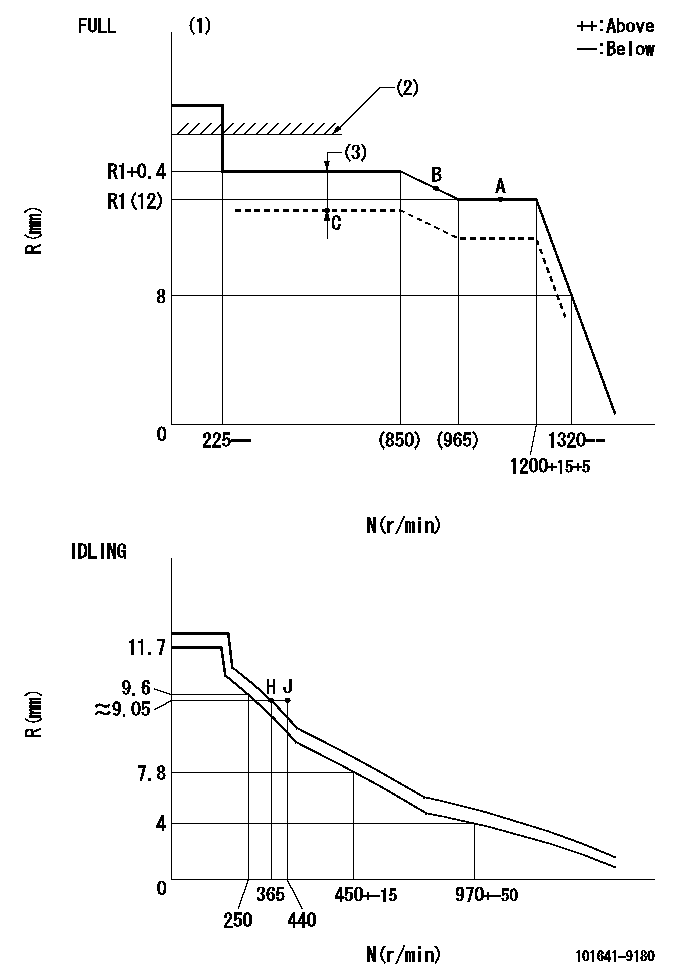
N:Pump speed
R:Rack position (mm)
(1)Torque cam stamping: T1
(2)RACK LIMIT: RAL
(3)Boost compensator stroke: BCL
----------
T1=43 RAL=14.6+0.2mm BCL=0.5mm
----------
----------
T1=43 RAL=14.6+0.2mm BCL=0.5mm
----------
Speed control lever angle
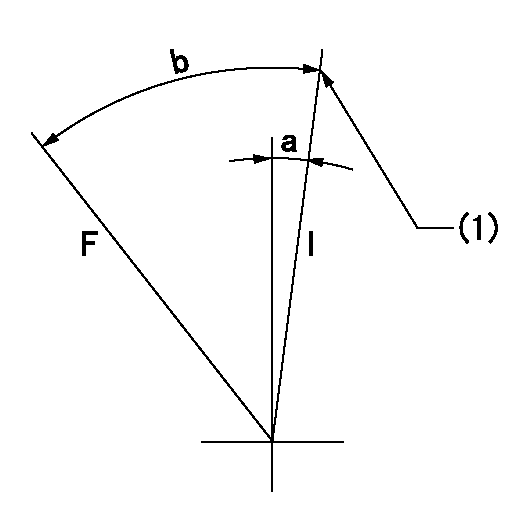
F:Full speed
I:Idle
(1)Stopper bolt set position 'H'
----------
----------
a=2deg+-5deg b=37deg+-3deg
----------
----------
a=2deg+-5deg b=37deg+-3deg
Stop lever angle
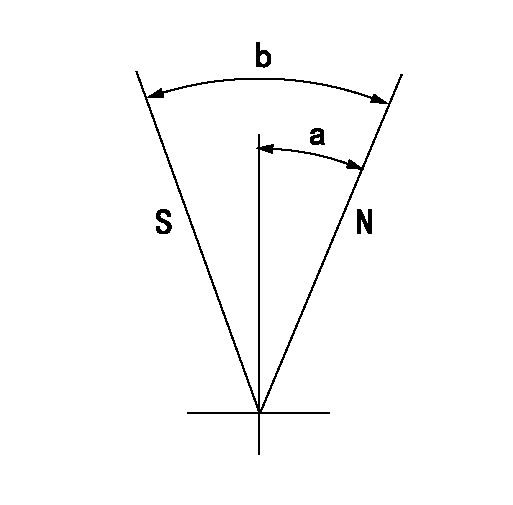
N:Pump normal
S:Stop the pump.
----------
----------
a=20deg+-5deg b=40deg+-5deg
----------
----------
a=20deg+-5deg b=40deg+-5deg
Timing setting
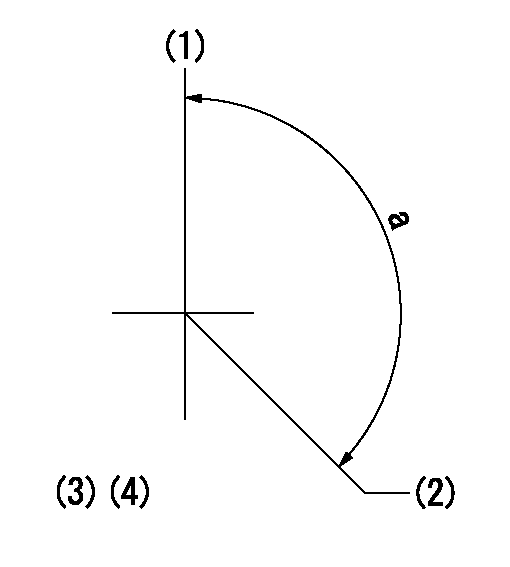
(1)Pump vertical direction
(2)Position of gear mark 'Y' at No 1 cylinder's beginning of injection
(3)B.T.D.C.: aa
(4)-
----------
aa=20deg
----------
a=(130deg)
----------
aa=20deg
----------
a=(130deg)
Information:
1. External View
(Natural-aspirated engine)
* This photo shows the model 6D14.(Turbocharged engine)
* This photo shows the model 6D14-T.2. Major Specifications
2.1 Major Specifications
2.2 Engine Outputs Classified by Application
1. The output (SAE, gross) is corrected to standard ambient conditions based on SAE J1349.2. The continuous rated output allows 10% (one hour) overload operation.3. Engine Number And Nameplate
(1) Engine number The engine number is stamped on the position as illustrated.Example: The engine number is important in knowing the history of the engine.(2) Nameplate The nameplate is attached to the portion as illustrated.The nameplate bears the followings: 4. General Precautions For Servicing
Before starting the service procedures, check the vehicle for total time driven, use conditions, and user's complaints and requests to know exactly the engine conditions. Record information where necessary.To ensure you are doing correct and efficient service jobs, observe the following precautions: (1) Before performing the service procedures given in this manual, know the trouble spots and isolate the possible cause to determine whether the removal or disassembly procedure is required.(2) Select a flat surface for the service job.(3) When servicing the electrical system, be sure to disconnect the negative cable from the battery.(4) Carefully check parts for oil leaks before cleaning. After cleaning, it may become difficult to spot defective areas.(5) Ready and make the most of the special tools required for servicing. Use the right tools (specified special tools) in the right place to prevent damages to parts and personal injury.(6) Make alignment marks and keep disassembled parts neatly arranged to ensure that they are reassembled into the right positions.* Special care must be taken for assemblies involving a number of parts, similar parts, or parts identical at right- and left-hand sides to ensure correct reassembly.* For alignment and punching markings, select a position that would not mar the appearance and function.* Clearly distinguish parts to be replaced from those reused. (7) The oil seals, packings, O-rings, and other rubber parts, gaskets, and split pins must be replaced with a new one whenever they are removed. For replacement, use Mitsubishi Genuine parts. (8) Apply the specified grease to U-packings, oil seals, dust seals, and bearings before installation.(9) When work requires an assistant or two, always make sure of the safety each other. Never play with switches and levers.(10) Make sure that your shoes are free from grease and oil especially when working on a heavy item.(11) When checking or changing lubricants, wipe off grease and oil from parts immediately with a waste.(12) Special care must be taken in handling sensors and relays which are suspectible to shocks and heat.(13) Use care so that hands and fingers are not injured by sharp edges or corners of the parts.(14) Wear safety goggles whenever handling a grinder or welding machine. Wear gloves as required to ensure utmost safety.5. General Bolts And Nuts Tightening Torque Table
Unless otherwise specified, the parts and equipment of vehicle must be tightened by the following standard bolts and nuts. Tightening torques for these bolts and nuts are shown below.
(Natural-aspirated engine)
* This photo shows the model 6D14.(Turbocharged engine)
* This photo shows the model 6D14-T.2. Major Specifications
2.1 Major Specifications
2.2 Engine Outputs Classified by Application
1. The output (SAE, gross) is corrected to standard ambient conditions based on SAE J1349.2. The continuous rated output allows 10% (one hour) overload operation.3. Engine Number And Nameplate
(1) Engine number The engine number is stamped on the position as illustrated.Example: The engine number is important in knowing the history of the engine.(2) Nameplate The nameplate is attached to the portion as illustrated.The nameplate bears the followings: 4. General Precautions For Servicing
Before starting the service procedures, check the vehicle for total time driven, use conditions, and user's complaints and requests to know exactly the engine conditions. Record information where necessary.To ensure you are doing correct and efficient service jobs, observe the following precautions: (1) Before performing the service procedures given in this manual, know the trouble spots and isolate the possible cause to determine whether the removal or disassembly procedure is required.(2) Select a flat surface for the service job.(3) When servicing the electrical system, be sure to disconnect the negative cable from the battery.(4) Carefully check parts for oil leaks before cleaning. After cleaning, it may become difficult to spot defective areas.(5) Ready and make the most of the special tools required for servicing. Use the right tools (specified special tools) in the right place to prevent damages to parts and personal injury.(6) Make alignment marks and keep disassembled parts neatly arranged to ensure that they are reassembled into the right positions.* Special care must be taken for assemblies involving a number of parts, similar parts, or parts identical at right- and left-hand sides to ensure correct reassembly.* For alignment and punching markings, select a position that would not mar the appearance and function.* Clearly distinguish parts to be replaced from those reused. (7) The oil seals, packings, O-rings, and other rubber parts, gaskets, and split pins must be replaced with a new one whenever they are removed. For replacement, use Mitsubishi Genuine parts. (8) Apply the specified grease to U-packings, oil seals, dust seals, and bearings before installation.(9) When work requires an assistant or two, always make sure of the safety each other. Never play with switches and levers.(10) Make sure that your shoes are free from grease and oil especially when working on a heavy item.(11) When checking or changing lubricants, wipe off grease and oil from parts immediately with a waste.(12) Special care must be taken in handling sensors and relays which are suspectible to shocks and heat.(13) Use care so that hands and fingers are not injured by sharp edges or corners of the parts.(14) Wear safety goggles whenever handling a grinder or welding machine. Wear gloves as required to ensure utmost safety.5. General Bolts And Nuts Tightening Torque Table
Unless otherwise specified, the parts and equipment of vehicle must be tightened by the following standard bolts and nuts. Tightening torques for these bolts and nuts are shown below.